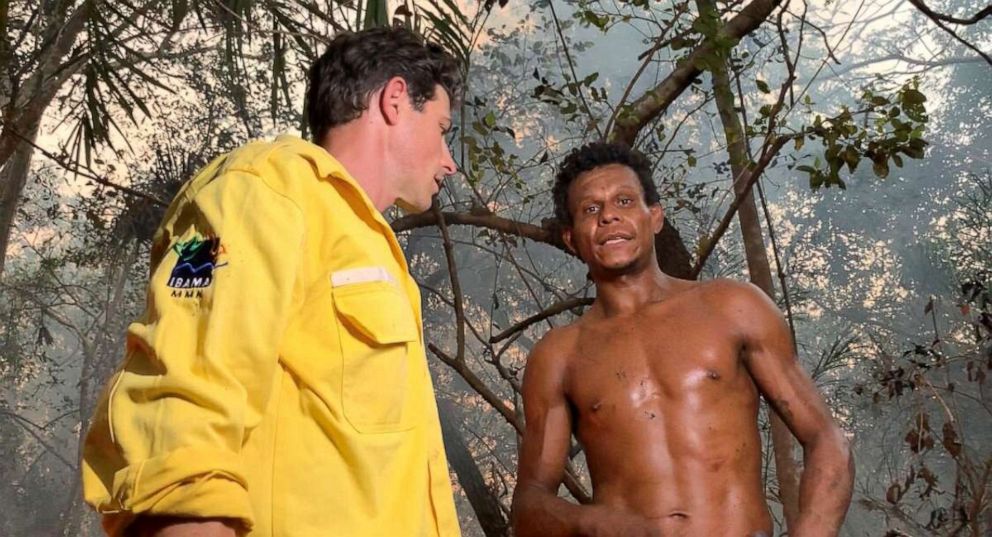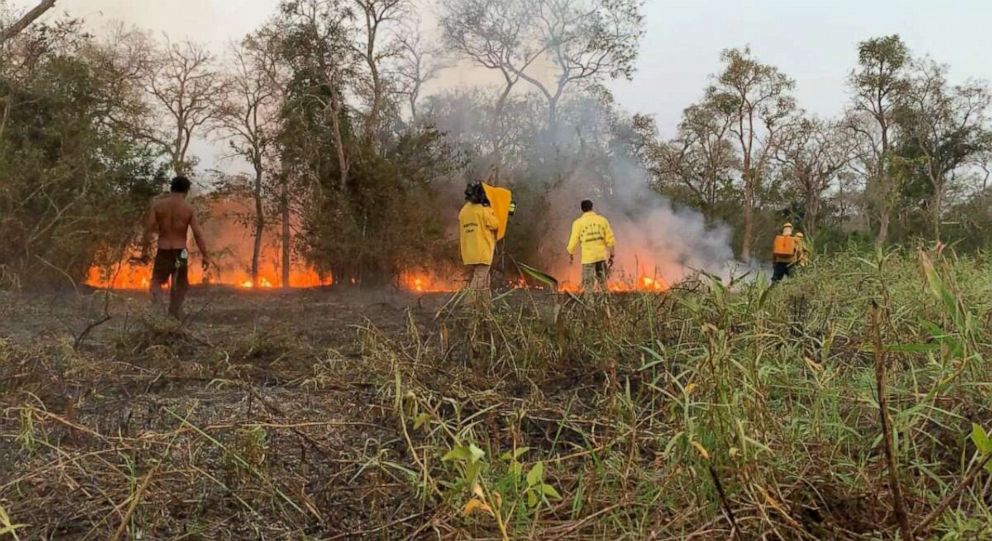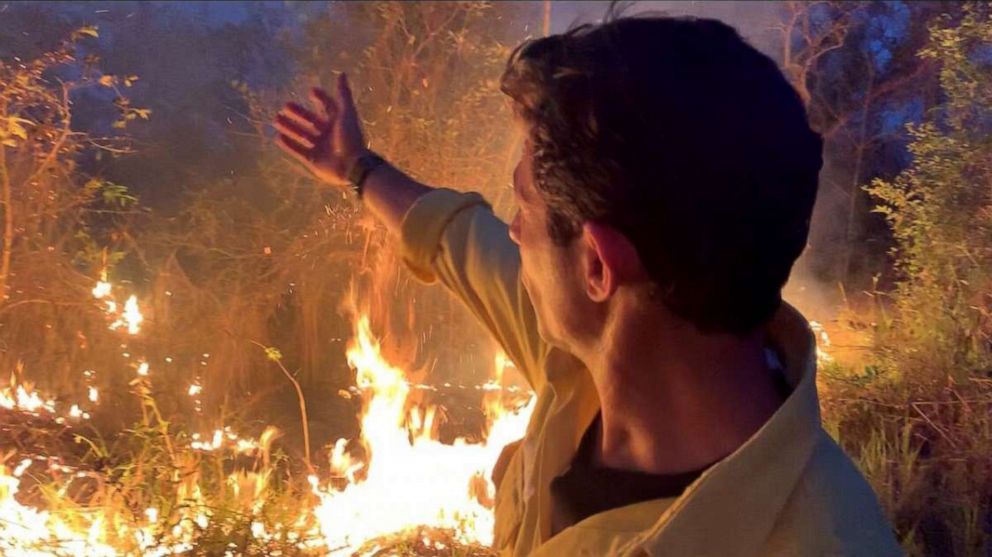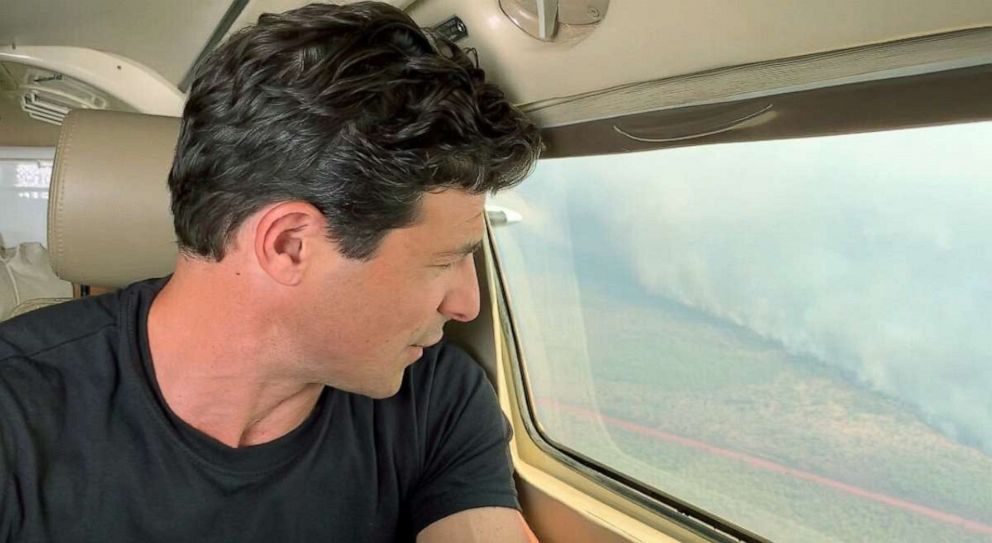Battling Brazil's fires with mats and water tanks: Reporter's Notebook
Fires function similarly everywhere -- it's what's in them that's different.
Their yellow fire suits were sodden from sweat. Each of the federal firefighters was equipped with either an 8-foot pole with what looked like a car floor mat attached to the end or a water tank attached to a sprayer, kind of like a child's Super Soaker.
They were alternately squirting water into the hip-high fire munching through the forest or slapping it down with those mats and using their snake-booted feet to kick dirt onto the embers. That one team was out there for 29 hours, trying to block the fire from reaching a nearby village.
Jefferson, a shirtless local villager, told us he had called in the fire and used his machete to hack a path for us through the jungle. Smothered in soot, he showed us how during the initial hours of the fire, he'd hacked down a sapling and used it to beat the fire back. The fire burned his cap, singed his hair and, he said, burned the shirt off his back.

We are snug against the Bolivian border in Brazil, abutting the world's largest wetland, the Pantanal. To find the firefighters, we'd joined up with the local head of the government agency IBAMA (the Brazil Institute of the Environment and Renewable Resources) that Brazil's President Jair Bolsnaro has talked about dissolving -- not because they are ineffective, but largely because he has said he wants to develop regions like Amazon and the Pantanal, so there's no need to protect the forests.
The government has barred IBAMA's firefighters from speaking to the press, but we were allowed to accompany them to a fire. Or, more accurately, their chief was allowed to accompany us -- because IBAMA's firefighters only have two trucks, both of which were being used by his teams, so the local head of the agency hitched a ride with us.
He and his team don't have radios, so the firefighters rely on cell phones -- but reception is nonexistent outside of the main towns. About 90 minutes out of the town of Curumba, our firefighter stopped at a tilting police shack by the side of the highway to ask whether anyone had seen his men. The officer had gone on walkabout, so we went around outside to find him. Wearing shorts and a T-shirt with a pistol packed against a love-handle, he pointed us down a dirt track, directing us vaguely 7 kilometers out.

We drove over a series of six creaky wood slat bridges spanning the wetland's canals, ditches and streams, at one point startling a caiman, an alligator-like reptile. Eventually, we reached a tiny village on the banks of the river surrounded by smoke. We stopped again to ask a local and a firefighter from a different agency where the federal firefighters might be found.
We moved on, passing bucket brigades -- villagers dousing fires scoop by scoop -- and it was getting dark when we finally found them.
The next day, we flew over that same fire complex -- a curtain of fire and smoke drawn across the horizon. Even at 3,000 feet, traveling a 400-mile round trip, it was impossible to see an end to the fire; it just kept going.
In Glendale, California, where I typically work, 215 firefighters were dispatched Sunday night to battle a 30-acre brush fire. Meanwhile, this region of Brazil, which is about twice the size of New Jersey, has 30 firefighters, who work seasonally.

Aboard that plane, we weren't circling looking for fires. We didn't have to. They were nearly everywhere. I've been covering wildfires in the American West for years and I've seen high flames and more intense heat, but never such an expanse of blackened earth.
There were small brush fires sending up a cigarette's wisp of smoke curling from the forest and massive complexes that could have been one fire or hundreds lighting up palm oil-rich palm trees like matchsticks.
We flew with Colonel Angelo Robelo, who heads the Institute of the Pantanal and has been working in this region for over 30 years. Six feet tall, square jaw and sturdy with a thatch of salt and pepper hair, he prefers to be called Colonel.
His withered right arm, the hand frozen into a semi-claw, is a testament to his time here -- he spent nearly 20 years chasing poachers in the Pantanal. Over the years, poachers killed two of his troops and shot him in the shoulder, destroying his arm.
Now a conservationist, he spends days perusing satellite data of the fires. He was quiet up above the infernos. He told us he'd never seen so much land lost to fires. He estimated that just in our journey alone, we'd seen about 2.5 million acres of forest burned -- an area a little less than the size of Connecticut.

The smoke turned the sun orange. At times it wafted into the cabin. The heat generated thermals that bounced the plane around violently. One jolt was so powerful we were slammed against the cabin's ceiling. The pair of pilots apologized.
The concept of firefighters making a difference is risible, said Robero. Only mother nature can make a difference. He said a series of rains often come in September, but it won't be enough. The dry season -- drier this season than most -- won't come for months.
On Saturday we drove out with Robelo toward a wetland just outside Corumba to watch a series of fires march towards this pristine habitat. A pair of toucans fluttered from the burning palm forest. We saw man-sized cranes called jabiru hang above that smolder, lifted by thermals. Fires function similarly everywhere -- it's what's in them that's different.
The firefighters we'd seen the day before had fought one fire -- out of the many hundreds burning in this region. The chief had told us he knew it was futile, but if they could save a few homes, that was better than nothing.
After darkness fell on the firefight, our team stumbled in the jungle trying to find our way back to the chief. Finally we heard his voice. He located us the same way he and his team often find each other -- hollering out in the woods and waiting for an answer.



